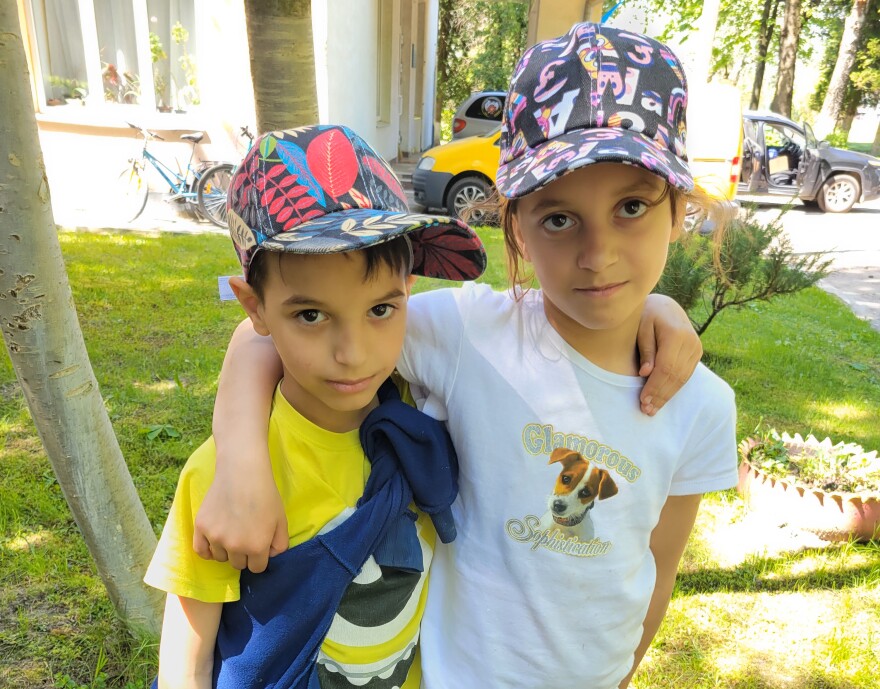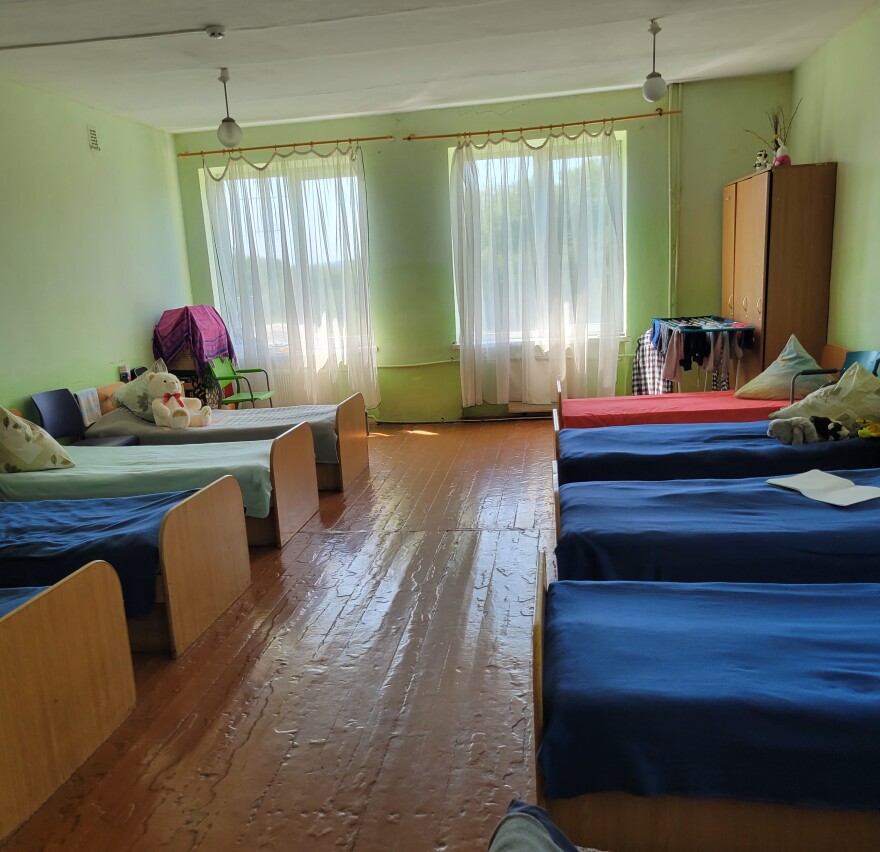Updated June 9, 2022 at 7:40 AM ET
VYNNYKY, Ukraine — In this town on the outskirts of Lviv in western Ukraine, on the unkempt grounds of a rambling concrete school building, a gaggle of school-aged children in brightly patterned baseball caps is playing on bicycles and skateboards. This is the temporary home of 31 children, the youngest just 5 years old.
They arrived here as a group evacuated from the northeastern city of Kharkiv in early March.
The evacuation happened really fast, explains Olga Dolgareva, one of the two caregivers who came east with these children. Russian airplanes started bombarding Kharkiv, and local officials and volunteers helped them move — first about 140 miles south to Dnipro by bus, and then all the way across the country in a jam-packed train. For many of them, says Dolgareva, it was their first time on a train, ever.
The United Nations estimates that two-thirds of Ukraine's children have had to leave their homes at some point in the three months since Russia invaded the country. Among those are tens of thousands for whom home, before the war, was an institution. Their fates underscore the daunting task of providing care and stability to all the country's children amid the chaos.
A safe place, but it's not home
"I like it here," says Olena, who's 11. "There's no bombardments. It's quiet." NPR is not using her last name to protect her privacy.

The children sleep together in large dormitories, converted from classrooms in the school, with two rows of beds. There's a comfortable bomb shelter in the basement when the air raid sirens go off, daily lessons for the children, a doctor on hand, even tae kwon do lessons. When we visit, they are packing for a summer excursion within Ukraine to the Carpathian Mountains.
There's just one thing Olena is missing.
"I want to go home," she says, her face crumpling. "I want to hug my mother, and tell her I love her."
None of these children are orphans — or at least, they weren't at the beginning of the war.
The place they evacuated from is one of a few hundred government-run child facilities of various kinds across the country: baby homes for infants and toddlers up to 3 years old, boarding schools where some of the students stay all year round and others go home on weekends, "family orphanages" with less than a dozen children and institutions for children with disabilities. Dolgareva's institution was originally founded as a tuberculosis sanatorium in the 1950s, and today cares for children for up to six months.
Collectively these places hold tens of thousands of children at a given time. Most are from poor and single-parent families.
Daria Gerasimchuk, the Ukrainian president's commissioner for children's rights, tells NPR the government's priority is for all children to live with loving families.
In the United States, children like these might be placed in foster care, or if they have disabilities, cared for at home with aides paid for by insurance or the government. Ukraine's policy of "deinstitutionalization" has been in place for a decade, Gerasimchuk says. But the transition away from Soviet-era practices is far from complete. And now, because of the war, more children will lose or be separated from parents and caregivers; and more families are under the kind of stress, including from poverty, that can lead to parental rights being challenged.
Children are waiting in unfamiliar places
When the war started, Gerasimchuk says, 83 of these group institutions were picked up and moved to safety within Ukraine, while another 181 were evacuated to Poland, Germany and elsewhere outside the country. Gerasimchuk emphasizes that these evacuation groups consisted of "children who lived in institutions before the war 24 hours a day. And we can say that those kids are from families with a difficult situation. And even before the war, they didn't have a stable contact with their parents."
It was at times a rocky process. Vilshany Orphanage is a facility for people with disabilities from 4 to 35-years-old, in far west Ukraine. Being in a relatively safe place, it received 38 evacuated people from two different institutions in the east of the country, added to the 175 who were already there. Many require around-the-clock care. In one case, their caregivers deposited them and then left. The institution gave up its rehabilitation room and two game rooms to house the newcomers. "We had no choice," says Bogdan Kykyna, who works at Vilshany Orphanage. "We have to admit that it is war and we have to do what we do."
Of the dozens of children Dolgareva originally evacuated from Kharkiv, most had parents or other relatives who were able to follow them west, reclaim them and sometimes take them out of the country as refugees. Of the 31 children now left, about a third have parents whose rights are being challenged by the state. During the war, those cases can't proceed, so the children are effectively in limbo.
Six-year-old Nika says she "doesn't know" how long she's been at the institution — Dolgareva says she came to them in November 2021.
Some of the children, especially the older ones, have their own phones that they use to keep in touch with their families. Others, like Nika, Olena and her little brother Zhenia, who's 9, have no idea what has happened to them in the past three months. "What can I say?" Olena sighs. "We lived in Kupiansk [now in occupied territory] and now it's under fire. I'm worried."
The soccer player
And then there's Ruslan, whose presence in Vynnyky is a simple twist of fate. Twelve years old, tall, with freckles and clear blue eyes, he comes up to a reporter without hesitation to tell his story. "My name is Ruslan," he says in English. "I am a sportsmen [athlete]," he adds.
Ruslan and the rest of his soccer team happened to be boarding a train to Lviv from their home in Kharkiv to play a big game on Feb. 23 — on the eve of the war. Once the Russian invasion started, it was decided that they should stay in Lviv.
Soon, the rest of the team's mothers came west to join them. Almost all left the country as refugees, for Portugal or Germany. But Ruslan's mother died a few years ago. His father wasn't allowed to leave the country due to the government mandate for men of conscription age to remain. He came out to visit Ruslan, but he didn't feel he could leave his post as an agronomist at the university in Kharkiv, and didn't think it was safe for Ruslan to come home. So Ruslan is waiting here.
NPR spoke to his father, Vitaly, who says he misses his son like crazy. He didn't want to give his last name to shield his son's identity. "The war, unfortunately, restricts us a lot in our choices. And sometimes we have to choose not things we really want," he says. "For now the first place, unfortunately, is life and safety."
There's another soccer player here too, with a similar story, from the occupied southeastern city of Melitopol. And there are two girls who evacuated west to stay with their older sister. She works long hours as a humanitarian volunteer, so the girls stay with Olga five days a week and go home to a nearby suburb on the weekend.
Why you can't adopt a Ukrainian child right now
Sherri McClurg is a clinical psychologist who directs an organization called New Horizons for Children, serving vulnerable children in Ukraine and around the world since 2005. Her organization has been working with local governments to resettle Ukrainian refugee children from institutions into temporary "safe havens" in Europe.
The country has chosen to freeze international adoptions for now, including those already underway, and McClurg and other advocates agree with the decision.
"A lot of people are advocating you throw away the process, let it happen once the children are here in the States or whatever other country," she says. "But that creates, again, a little bit more chaos and a little bit more risk. And I know these families love and care for these children. I'm not trying to say they shouldn't get their children. But again, there's a reason for that process and we need to be super careful."
A trauma on top of a trauma
With nearly the entire country on the move, ensuring children's well-being while protecting their and their families' rights is not going to be easy.
On June 1, Ukraine's Children's Day, President Volodymyr Zelenskyy spoke to the plight of the nation's children. At least 243 have been killed in the war and another 446 injured. He further alleged that Russia has forcibly deported an estimated 200,000 children into its territory, including some children from institutions.
"We have to get them out of shelling. We have to get them physically safe," McClurg says. "But then we also have to take care of them emotionally. And what does that look like? Because these are kids from complex developmental trauma and now we've added a whole other layer of situational trauma. We've got to help calm things down for them."
McClurg is trying to support caregivers in safe havens with mental health techniques — as simple as breathing, or staying hydrated — so they can support the children. Because, she points out, the caregivers are traumatized by the war too.
Zhanna Marchenko, the other caregiver for the children in Vynnyky, says although they're happy enough in the daytime, a lot of the little ones talk in their sleep. The youngest boy wakes up every night and says he's scared, demanding that she sleep in their room.
Marchenko and Dolgareva don't expect to go back to Kharkiv before the end of the summer. So for now these children will stay together, far from anything that feels like a home.
Copyright 2022 NPR. To see more, visit https://www.npr.org.







